Weekly Update: July 8, 2025

1. The Real Energy Cost of AI (WSJ Video)
Summary:
- AI training and inference—especially with large language models—consume massive energy, comparable to powering millions of homes.
- WSJ’s Joanna Stern uses steak preparation and data-center footage to illustrate AI’s carbon footprint and hidden costs.
- Cloud providers are racing to build “green” data centers powered by renewables and advanced cooling.
- Despite advancements, AI’s energy demand remains a potential bottleneck for both cost and sustainability.
Relevance for Business:
Energy costs and ESG impact are becoming central to AI deployment decisions; companies must assess total energy/budget implications when adopting AI solutions.
Call to Action:
- Conduct an energy-performance audit for any AI implementation.
- Partner with cloud vendors that publish renewable usage stats.
- Factor in carbon/NRE offsets as part of your AI budget.
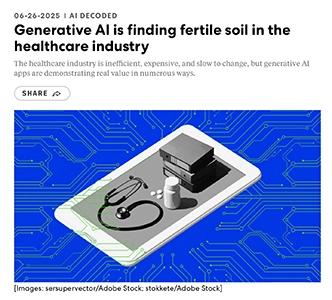
2. Generative AI in Healthcare (FastCompany)
Summary:
- Generative AI is gaining traction in healthcare: supporting diagnostics, personalized treatments, and automating documentation.
- It’s easing clinician workloads, reducing time to insight, and mitigating burnout.
- However, data privacy, bias, and regulatory oversight remain key concerns.
- Pilot programs are thriving in telehealth and preventive medicine, but wider adoption requires careful governance.
Relevance for Business:
Healthcare SMBs (clinics, payors, telehealth platforms) can realize efficiency and quality improvements—with proper data controls.
Call to Action:
- Launch a small-scale generative AI pilot (e.g., automated charting).
- Establish an AI governance committee with legal/clinical oversight.
- Invest in certified vendors with HIPAA-compliant models.
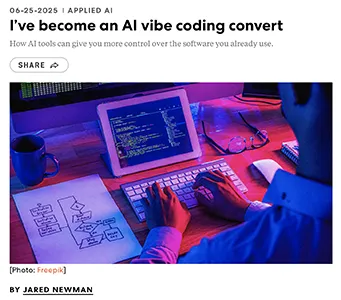
3. “I’ve Become an AI Vibecoding Convert” (FastCompany)
Summary:
- “Vibecoding” refers to using AI-assisted tools like Copilot to shape the “feel” or tone of content in creative work.
- The author details how AI influences their writing, design, and creative ideation—becoming a utility rather than a gimmick.
- They identify a creative-boosting feedback loop: AI offers stylistic suggestions, which refine the work, then refine future prompts.
- The experience blurs the line between human and machine-generated creativity, empowering new hybrid workflows.
Relevance for Business:
Any company producing content—marketing assets, internal communications, or creative campaigns—can accelerate output and refine tone with AI.
Call to Action:
- Train content teams on prompt engineering and style coaching with generative AI.
- Create an internal “tone guide” to align AI output with brand voice.
- Measure quality gains: time saved, brand sentiment, and revision cycles.
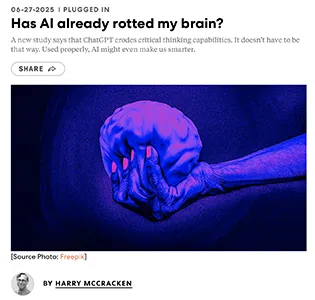
4. AI & Critical Thinking – MIT Study (FastCompany)
Summary:
- MIT researchers tested whether AI tools undermine or enhance human critical thinking.
- They found that AI can lead to overreliance, reducing users’ reasoning depth when prompting uncritically.
- However, when paired with structured guidance, AI boosted analytical rigor and decision quality.
- The key is coupling AI suggestions with validation steps, not simply accepting answers blindly.
Relevance for Business:
Deploying AI without proper oversight may dull reasoning abilities, but guided frameworks can elevate staff capabilities.
Call to Action:
- Implement dual-workflow templates: AI output + manual check.
- Train staff on “critical prompting”: ask follow-up questions to AI.
- Build role-based protocols where AI aids, not replaces, analysis.
🔍 Study Overview
Researchers at MIT Media Lab conducted an EEG-based experiment involving 54 individuals (ages 18–39) writing SAT-style essays in three conditions: with ChatGPT, with Google Search, and unaided. The primary goal was to assess brain engagement and writing ownership. (fastcompany.com, time.com)
🧠 Key Findings
- Lowest brain engagement: ChatGPT users exhibited the weakest neural activity across executive and memory-related regions, compared to both Google and no-tool groups. (time.com)
- Mechanical, less creative output: Essays from ChatGPT users were viewed as formulaic and “soulless.” Over time, participants leaned heavily on copy-pasting. (time.com)
- Poor knowledge retention: When users were later asked to rewrite their essays without AI, they recalled little—unlike those who initially wrote unaided. (time.com)
⚠️ Cognitive Risks Identified
- Cognitive off‑loading: Relying on AI can bypass deep thinking processes, leading to long-term “cognitive debt.” (washingtonpost.com)
- Potential skill erosion: Especially for younger users or entry-level employees, overdependence may diminish critical thinking, creativity, and problem-solving abilities. (nypost.com)
✅ Encouraging Counterpoints
- Balanced AI usage: Google Search users showed healthy brain activation, suggesting AI can support tasks without replacing core cognitive work. (time.com)
- Strategic AI integration: A controlled ChatGPT tutor in a Wharton study improved performance and retention when designed with safeguards.
- AI as creativity stimulus: Tools like “BioSpark”—which use nature-inspired prompts—are being explored to stimulate, not substitute, human thinking. (washingtonpost.com)
✅ Business Implications & Actionable Takeaways
1. Protect Cognitive Capacity
- Encourage employees—especially junior staff—to tackle foundational tasks manually before using AI for refinement or drafting.
- Promote exercises and training that enhance critical reasoning and written communication.
2. Implement Thoughtful AI Policies
- Clearly define where direct AI use is acceptable (e.g., first drafts, research support) vs. where independent thinking must prevail (e.g., decision-making, original analysis).
- Design workflows that require human oversight and critical review of AI-generated outputs.
3. Design AI as a Partner, Not a Crutch
- Use AI tools that explain their reasoning, present alternative viewpoints, and allow editable transparency—encouraging active engagement. (fastcompanyme.com, nypost.com)
- Adopt metacognitive prompting (e.g., tools reminding users to reflect or question AI suggestions) to maintain healthy cognitive habits .
4. Monitor & Measure Impact
- Track changes in work quality and cognitive performance after implementing AI tools.
- Provide ongoing feedback and tailored training to reinforce deep-thinking behaviors.
5. Foster an AI-Empowered Culture
- Emphasize that optimal outcomes come from a blend of human insight and AI efficiency.
- Promote examples of employees using AI to spark innovation—such as prototyping ideas or exploring new domains.
🔑 Summary for SMB Leaders
AI can drive productivity—but only when guided, not blindly trusted. The MIT study highlights risks: duller thinking, lower engagement, and weaker learning when ChatGPT is used as a substitute. However, with the right integration—supporting, not replacing human thinking—AI can become a powerful enabler.
Strategic approach:
- Identify use cases where AI adds value without cognitive harm.
- Set clear usage guidelines and require critical review.
- Train your team to use AI thoughtfully—as a partner in thinking.
By increasing oversight, promoting metacognition, and measuring outcomes, SMBs can harness AI to sharpen—not soften—their teams’ critical thinking abilities.
https://www.fastcompany.com/91358021/ai-critical-thinking-mit-study: Weekly Update: July 8, 2025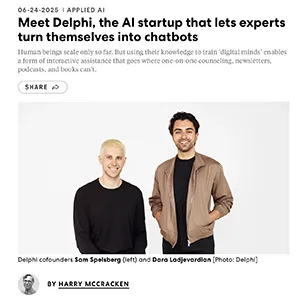
5. Delphi AI: Digital Mind (FastCompany)
Summary:
- Delphi is described as an “AI digital mind” that offers human-like advice across domains.
- Rather than conventional search, Delphi guides users conversationally—with context and nuance.
- It surfaces probable outcomes and ethical implications, mimicking a deliberative dialogue rather than dictation.
- The tool aims to be a reliable assistant, though transparency around how it generates reasoning remains debated.
Relevance for Business:
SMBs can leverage semantic AI like Delphi for complex decision support—in legal, HR, strategy—without hiring senior analysts.
Call to Action:
- Pilot Delphi (or equivalent) for executive Q&A.
- Use it in risk/OKR workshops to surface diverse pathways.
- Monitor for reasoning transparency and auditability.
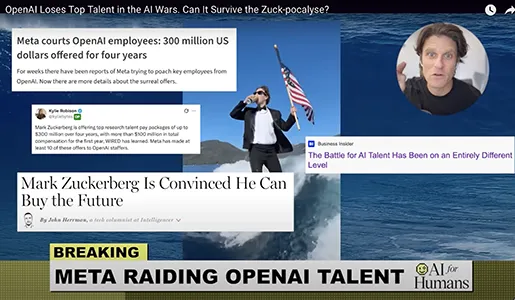
AI For Humans: OpenAI Loses Top Talent in the AI Wars. Can it Survive the Zuck-pocalypse?
AI For Humans – July 3, 2025
Meta (Facebook) has reportedly lured away over 10 top OpenAI engineers, offering compensation packages rumored to reach $300 million, signaling a fierce new front in the AI talent war.
OpenAI CEO Sam Altman framed the battle as “missionaries vs. mercenaries,” while Apple is rumored to be considering a radical move: outsourcing its entire AI stack to Anthropic or OpenAI to fix its floundering AI strategy.
Microsoft unveiled a breakthrough AI medical model that outperforms human doctors fourfold in complex diagnoses, and Google DeepMind hinted at AI-generated playable video game worlds.
Additional highlights include AI-made music gaining traction on Spotify, Korea’s first AI-animated series, and the rise of affordable open-source humanoid robots.
Relevance for Business:
The accelerating AI arms race affects every industry—from healthcare and entertainment to consumer devices and talent retention. Companies must monitor these rapid shifts to stay competitive.
Calls to Action:
- Talent Strategy: Assess AI talent needs and consider incentives to retain key employees as AI expertise becomes more competitive.
- AI Partnerships: Explore partnerships with leading AI providers (OpenAI, Anthropic, Google) to avoid falling behind in AI capability.
- Healthcare Innovation: Evaluate AI diagnostic tools to enhance healthcare offerings or reduce operational costs.
- Content Creation: Investigate AI-driven media production for marketing, training, or entertainment projects.
Here’s a concise executive summary of the Velvet Sundown section on AI music generation from the podcast:
Executive Summary: Advances in AI Music Generation – The Velvet Sundown Case
A mysterious band called The Velvet Sundown sparked debate after gaining over 600,000 Spotify streams, with speculation that the music was either fully AI-generated or heavily AI-assisted as a marketing ploy. The music itself is described as generic, retro-inspired pop—raising questions about the creative value of AI-generated songs and the backlash from traditional music communities. The story reflects broader tensions as AI becomes more embedded in music creation, with other artists, like Timbaland, also launching AI-generated music projects that are drawing mixed reactions. The discussion highlights the growing reality that AI tools are increasingly capable of producing commercially viable music, though audiences and artists remain divided on authenticity and artistic merit.
Relevance for Business:
AI music generation is advancing rapidly, opening up new opportunities for marketing, content creation, and branded audio—but also risks backlash over authenticity and creative value.
Calls to Action:
- Explore AI-generated audio for marketing, podcasts, or brand jingles.
- Monitor public sentiment to avoid reputational risks when using AI-generated creative content.
- Consider transparency when deploying AI-generated media to build audience trust.
The Velvet Sundown and broader concerns around AI music:
🎧 Velvet Sundown: AI Band Stirring the Pot
- The band surged to over 600K monthly Spotify listeners within weeks, prompting deep skepticism from music journalists and fans due to their eerily perfect retro aesthetic, lifeless AI‑style photos, and no verifiable public record (thetimes.co.uk).
- Streaming service Deezer flagged the tracks as possibly AI-generated, while Spotify has not yet labeled them—raising transparency and authenticity concerns (thetimes.co.uk).
- The band responded via X (Twitter), denying the allegations:
“Every chord… — HUMAN.” (fastcompany.com)
- The controversy sheds light on algorithm-driven promotion: AI-generated content can manipulate platform algorithms and potentially supplant real artists (thetimes.co.uk).
🎵 Broader Backlash & Industry Response
- Major labels (RIAA, Universal) are suing platforms like Suno and Udio over unauthorized use of copyrighted material in AI training, citing fair use defenses (theverge.com).
- In response, Tennessee has passed AI music transparency laws, and UK musicians including Elton John and Paul McCartney are lobbying for stricter regulations (wpln.org).
- Industry questions are emerging:
- Can AI-generated content flood platforms, devalue human creativity, or mislead listeners? (en.wikipedia.org, en.wikipedia.org)
- Will labeling AI music be necessary to maintain trust? (wpln.org)
💡 Key Takeaways for SMB Executives
- AI music is gaining traction fast ― it can outperform in volume and scalability, but authenticity remains under fire.
- Transparency is essential ― platforms and creators should clearly label AI-generated content to build and preserve trust.
- Legal risks are mounting ― expect increased scrutiny and potential lawsuits over copyright and lack of disclosure.
- Opportunity for early adopters ― brands can harness AI audio for cost-effective content, provided they use it responsibly and ethically.
🆕 Additional AI Developments for SMBs – Week of July 3, 2025
OpenAI’s New Desktop App & Potential Open-Source Model
- OpenAI is reportedly launching a new desktop-native app and an open-source AI model that could outperform GPT-3.5-level models. This may dramatically lower costs and increase data privacy for SMBs who want to run AI locally.
- Action: SMBs should start evaluating on-device AI for internal tools, note-taking, and customer service.
AI-Enhanced Business Search from Perplexity.ai
- Perplexity.ai continues to roll out enterprise-focused AI search features, blending retrieval-augmented generation (RAG) with deep search and real-time updates.
- Action: SMBs in research-heavy industries (law, consulting, finance) should explore AI search tools to replace or supplement Google.
New AI-Powered Document Drafting from Microsoft & Google
- Microsoft 365 Copilot and Google Workspace AI updates are now pushing context-aware document drafting and analysis tools directly into Word, Excel, and Gmail.
- Action: SMBs can automate proposals, sales pitches, reports, and even legal agreements—saving significant time.
Anthropic’s Claude 3.5 Family Is Live
- Claude 3.5 models from Anthropic are now available with higher accuracy and longer context handling. Claude is seen as one of the most “business-friendly” chat models.
- Action: Consider comparing Claude to ChatGPT for internal business writing, analysis, and knowledge management.
EU and US AI Regulation Drafts Progressing
- Both Europe and the U.S. have published updated AI regulation frameworks, with transparency, bias audits, and watermarking requirements gaining traction.
- Action: SMBs should start preparing compliance frameworks, especially if using AI in customer-facing apps or sensitive industries.
🔑 AI Industry Developments – Week of June 24, 2025
1. Google DeepMind Launches Gemini Robotics On-Device
- Google released a new AI model allowing robots to operate locally without constant cloud access—boosting privacy, speed, and reliability.
- Initially designed for ALOHA robots, it now supports Franka FR3 and Apollo humanoids.
- Action: SMBs in manufacturing, logistics, or retail automation should explore localized AI robotics to reduce costs and increase operational resilience.
2. Walmart Equips Store Staff with AI Tools
- Walmart announced AI-powered tools to enhance workflow efficiency and employee satisfaction across stores.
- This reflects the growing trend of AI-augmented frontline workers.
- Action: SMBs should evaluate where AI can empower—not replace—employees, particularly in retail, hospitality, and operations.
3. Amazon Builds Giant Data Center for Anthropic (Project Rainier)
- Amazon broke ground on a 1,200-acre AI supercenter in Indiana using Trainium 2 chips to support Anthropic’s AI operations.
- This marks a massive investment in AI infrastructure.
- Action: SMBs relying on cloud AI should anticipate faster, more powerful AI services and possibly lower costs as infrastructure scales.
4. Anthropic Wins Partial Victory in AI Copyright Case
- A judge ruled that training AI models on legally purchased books is fair use, though storing pirated content remains contentious.
- This sets an early precedent in AI copyright battles.
- Action: SMBs using or developing AI should stay informed on evolving copyright law to avoid legal risks in content or training data use.
5. ElevenLabs Debuts Voice Assistant 11ai
- ElevenLabs released 11ai, a customizable voice assistant featuring voice cloning and multi-tool integration.
- It’s free in alpha to gather feedback.
- Action: SMBs can experiment with AI voice tools for customer service, accessibility, and internal task management.
6. OpenAI Faces Trademark Dispute Over io Acquisition
- OpenAI’s acquisition of io, an AI hardware startup, hit a trademark snag with iyO but remains on track.
- This reflects increasing competition in AI hardware development.
- Action: SMBs exploring AI hardware (wearables, sensors, edge devices) should watch this space for emerging partners and tools.
7. AI Job Market Evolution: From Boom to Strategic Growth
- AI hiring has slowed but specialized, with demand for machine learning, LLM fine-tuning, and AI ethics.
- Opportunities are spreading beyond traditional tech hubs.
- Action: SMBs hiring for AI roles should focus on niche expertise and flexibility, not just volume hiring.
8. Education & Access: AI Learning Expands
- DeepLearning.AI launched a new course on building apps with Llama 4.
- Google Colab AI-first tools are now free to all users.
- Action: SMBs should encourage continuous AI learning for staff to close skill gaps without large investments.
9. Gartner: High Failure Rate Predicted for Agentic AI Projects
- Gartner forecasts that many autonomous AI projects may fail due to overhype and under-delivery.
- Action: SMBs should approach agentic AI (AI that acts independently) cautiously, starting with low-risk pilot projects.
10. Rising Concerns: AI Job Displacement & Scams
- Reports highlight growing fears of AI-driven job loss and the rise of deepfake and voice-cloning scams.
- Action: SMBs must invest in AI risk awareness, employee retraining, and security measures to guard against fraud.
